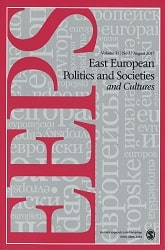Guilt, Sympathy, and Cooperation: EU–Baltic Relations in the Early 1990s
Guilt, Sympathy, and Cooperation: EU–Baltic Relations in the Early 1990s
Author(s): Ainius LašasSubject(s): Governance, Political history, International relations/trade, Transformation Period (1990 - 2010), EU-Accession / EU-DEvelopment
Published by: SAGE Publications Ltd
Keywords: EU enlargement; Baltic states; collective guilt;
Summary/Abstract: The period between March 1990 and June 1993 represents the critical window for European Union (EU)–Baltic relations. During this time Estonia, Latvia, and Lithuania laid the foundation for future EU membership. For its part, the European community made a commitment to include the three republics in the process of enlargement. This paper traces the beginnings of EU–Baltic cooperation and examines factors that led to growing political and economic convergence. Nordic membership in the EU, ex-Soviet troop withdrawal, and Russian parliamentary elections were instrumental in bringing both sides together on the road to enlargement, but collective guilt provided the underlying rationale. In this paper, the author argues that it is impossible to understand fully this process of convergence without taking into account the connotations and consequences of the “black trinity”: the Munich pact, the Molotov-Ribbentrop pact, and the Yalta agreement.
Journal: East European Politics and Societies
- Issue Year: 22/2008
- Issue No: 02
- Page Range: 347-372
- Page Count: 26
- Language: English
- Content File-PDF

